
Don’t Go It Alone, Call McGlone
Don’t Go It Alone, Call McGlone
Don’t Go It Alone, Call McGlone
Don’t Go It Alone, Call McGlone
Highly experienced Terre Haute & Indianapolis Rideshare Accident Lawyers. Three generations of expertise.
Highly experienced Terre Haute & Indianapolis Rideshare Accident Lawyers. Three generations of expertise.
Ridesharing companies like Uber and Lyft have grown substantially in popularity since their inception several years ago. As a result, many commuters use their services to travel to and from their destinations. Additionally, with the increased popularity of ridesharing, there comes more potential to be involved in an accident in Terre Haute. In fact, according to a 2018 study conducted by the University of Chicago and Rice University, rideshare companies are responsible for a 2-3 percent increase in the total number of fatal traffic accidents. This amounts to as many as 1,100 fatalities per year.
However, because of the newness of these services, the laws that govern these businesses are still trying to catch up. If you have been injured in an accident in Terre Haute, knowing who is liable for the damages you have suffered can be challenging.
To ensure that you are protected after being involved in an accident, you need to hire an experienced attorney who understands ever-changing ridesharing laws. McGlone Law of Terre Haute, Indiana has lawyers well-versed in car accident and personal injury law and can help you obtain compensation for your injuries.
Contact our law firm and ask to schedule a meeting to discuss your case and answer your legal questions.
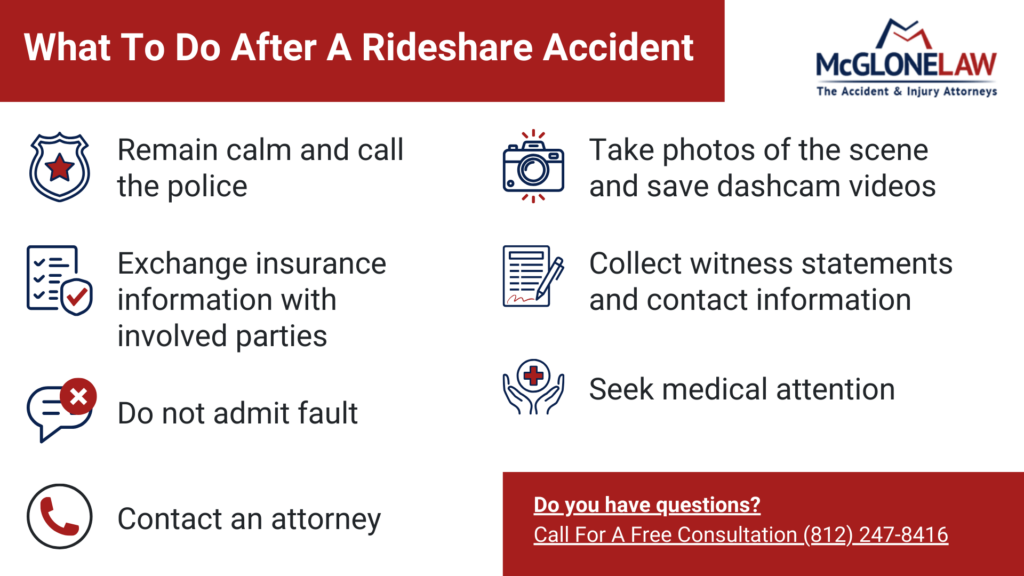
It’s important to call the police right away after a rideshare accident in Terre Haute. Getting a police report filed will help you recover the compensation you deserve. While at the scene, remain calm. Arguing or otherwise becoming aggressive might turn into a disastrous situation. Things could escalate quickly, and even someone not previously at fault could end up in legal jeopardy.
You should always collect the driver’s license, proof of insurance and contact details for all parties involved in the accident in Terre Haute. If you were the passenger in a rideshare vehicle or you were hit by a rideshare driver, make sure to get the insurance information for both their personal insurance and their company insurance. Depending on if the rideshare driver was “on the clock”, you may need to pursue their company or personal insurance. See our FAQ section “What are the rideshare insurance requirements in Indiana?” for more detail.
Even if you made an error, you may not be entirely at fault. It’s important not to admit fault in the heat of an accident in Terre Haute because it can hurt you in court later. You may end up admitting fault when you weren’t entirely at fault or even when you weren’t at fault at all.
Photographic and video evidence of the damage to both vehicles, the positioning of the vehicles, skid marks, will help with reconstructing the accident in Terre Haute, proving fault, and recovering the compensation you deserve.
Witness statements can add credibility to your statements about what happened in Terre Haute. If possible, talk to those who witnessed the accident and get their contact information so they can be contacted later if needed.
Even if you don’t think you are seriously injured, you should always seek medical attention after an accident in Terre Haute. You may have injuries that haven’t presented yet because of the adrenaline from the accident. If you wait, the insurance company will use your decision to not seek medical attention against you, claiming that you must not be injured badly if you didn’t seek help. This also goes for follow up visits. You should see your doctor every 30 days while your case is ongoing.
The best way to get the compensation you deserve is by contacting an attorney who specializes in rideshare accident cases in Terre Haute. Using an attorney will ensure that you’ve got someone in your corner who knows all the ways the insurance companies are going to try to devalue your claim and who won’t let that happen to you. When looking for an attorney, look for one trained in accident reconstruction and skilled in rideshare accident personal injury cases. This kind of attorney will have the knowledge and experience with these kinds of cases that will best position them to advocate for you and the compensation you deserve.
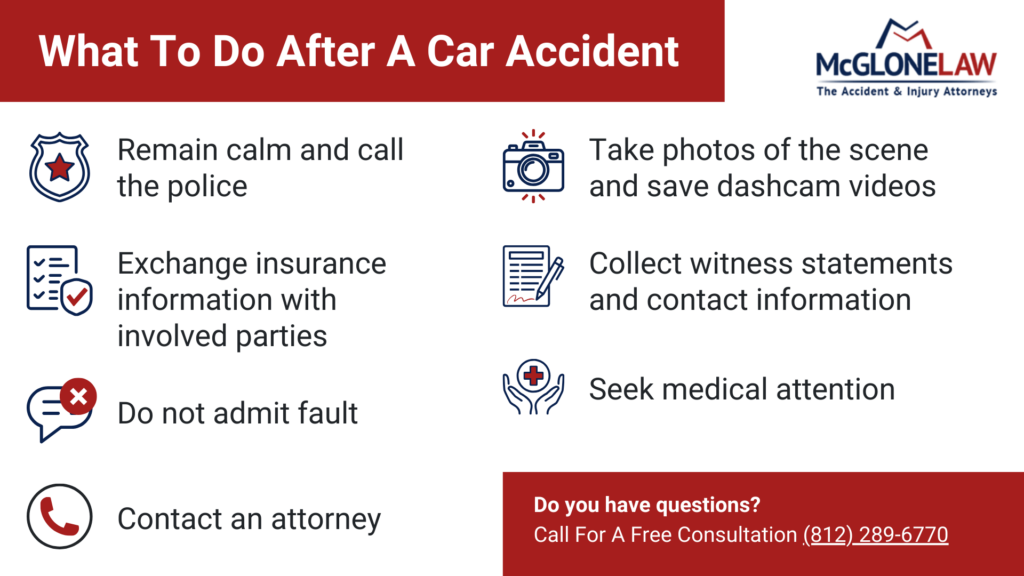
It’s important to call the police right away after a rideshare accident. Getting a police report filed will help you recover the compensation you deserve. While at the scene, remain calm. Arguing or otherwise becoming aggressive might turn into a disastrous situation. Things could escalate quickly, and even someone not previously at fault could end up in legal jeopardy.
You should always collect the driver’s license, proof of insurance and contact details for all parties involved in the accident. If you were the passenger in a rideshare vehicle or you were hit by a rideshare driver, make sure to get the insurance information for both their personal insurance and their company insurance. Depending on if the rideshare driver was “on the clock”, you may need to pursue their company or personal insurance. See our FAQ section “What are the rideshare insurance requirements in Indiana?” for more detail.
Even if you made an error, you may not be entirely at fault. It’s important not to admit fault in the heat of an accident because it can hurt you in court later. You may end up admitting fault when you weren’t entirely at fault or even when you weren’t at fault at all.
Photographic and video evidence of the damage to both vehicles, the positioning of the vehicles, skid marks, will help with reconstructing the accident, proving fault, and recovering the compensation you deserve.
Witness statements can add credibility to your statements about what happened. If possible, talk to those who witnessed the accident and get their contact information so they can be contacted later if needed.
Even if you don’t think you are seriously injured, you should always seek medical attention after an accident. You may have injuries that haven’t presented yet because of the adrenaline from the accident. If you wait, the insurance company will use your decision to not seek medical attention against you, claiming that you must not be injured badly if you didn’t seek help. This also goes for follow up visits. You should see your doctor every 30 days while your case is ongoing.
The best way to get the compensation you deserve is by contacting an attorney who specializes in rideshare accident cases. Using an attorney will ensure that you’ve got someone in your corner who knows all the ways the insurance companies are going to try to devalue your claim and who won’t let that happen to you. When looking for an attorney, look for one trained in accident reconstruction and skilled in rideshare accident personal injury cases. This kind of attorney will have the knowledge and experience with these kinds of cases that will best position them to advocate for you and the compensation you deserve.
Out-of-pocket expenses you have because of the accident. These include: past and future medical bills, lost wages, loss of future earning capacity, and property damage.
Intangible losses that don’t have a fixed dollar amount and are subjective. These include: pain and suffering, loss of enjoyment of life, loss of companionship, and permanent disfigurement and scarring.
Punitive damages are awarded to punish the defendant for wrongdoing and to discourage others from repeating the behavior. These may be awarded when the defendant has acted intentionally recklessly or with gross negligence.
Our law firm is uniquely qualified to help personal injury victims recover damages that may be appropriate for their particular case. For example, Indiana law is stringent regarding allowing plaintiffs to try and recover punitive damages. In most instances, the injury victim is not entitled to file a claim for punitive damages simply because the defendant in the case acted negligently but not with willful intent to cause harm.
Nevertheless, an injury victim may recover punitive damages if it can be demonstrated that the other party knowingly acted in a manner that any reasonable person would believe had a probability of causing harm or injury.
If you feel that your case qualifies for punitive damages, you need to consult with a personal injury lawyer immediately. At McGlone Law, our lawyers have the experience to determine if your case qualifies for punitive damages and what amount would be appropriate to request in a settlement.
If you were injured in a rideshare accident in Indiana, the rideshare driver’s status at the time of the accident will play a significant role in determining liability and the compensation you can pursue. There are three main rideshare driver statuses:
While Indiana has minimum insurance requirements for rideshare companies, individual companies (Uber, Lyft, etc.) might have additional coverage details in their contracts with drivers. If you’ve been in a rideshare accident, it’s crucial to speak with an attorney experienced in these types of cases. They can assess the specific circumstances of your accident, determine who might be liable, and help you navigate the complexities of rideshare insurance policies to get the compensation you deserve.
If you have been involved in an accident with a rideshare driver, you may be able to recover damages if:
McGlone Law of Terre Haute, Indiana has knowledgeable attorneys with a great deal of experience in successfully handling rideshare accident claims. Contact our law offices and ask to schedule a meeting to learn more information about how we can assist you in potentially collecting damages as a result of your accident.
Indiana’s rideshare insurance requirements are a bit complex, as there’s a shared responsibility between the rideshare company and the driver’s personal insurance policy.
Here’s a breakdown:
The specific details of the rideshare company’s insurance and when it applies can vary depending on the company (Uber, Lyft, etc.). Some rideshare companies also provide additional coverage, such as uninsured or underinsured driver insurance.
If you have been involved in a rideshare accident, you need to hire an experienced attorney immediately. Rideshare accidents are often confusing and challenging to try and navigate on your own. Uber and Lyft have several different periods of time that apply to their drivers, such as when they are on duty, waiting, on their way to pick up a fare, or driving a passenger to a destination. A great deal of your accident claim can hinge on which period the rideshare driver was in when the crash occurred.
Our rideshare accident attorneys can evaluate the evidence and file a claim on your behalf. In addition, we can also fight to have your vehicle fixed or replaced or negotiate with the insurance company to help you recover maximum compensation for your injuries.
Contact our law offices by calling (812) 247-8416 and asking to schedule a free consultation today.
We handle any rideshare accident case where you are not at fault. If you are partially at fault, we can still take your case as long as the other party is 51% or more at fault. Sometimes fault is unclear, so if you’ve been in a rideshare accident call us at (812) 247-8416 today for a free, no-obligation consultation.
Yes, you can. Multiple parties can be liable for the accident, and you shouldn’t assume that because you may have done something wrong, you are 100% at fault. Indiana follows a comparative negligence law. This law can mean that each party involved in an accident is assigned a percentage of fault, depending upon what they did or failed to do that helped to cause the accident. If you are assigned more than 51%, you are unable to pursue damages.
Several factors work together to establish fault after a rideshare accident. Evidence includes pictures or videos of the scene and vehicles, police records, witness statements, and more. Read our blog to learn more about comparative negligence and partial fault.
The statute of limitations for most personal injury cases, including rideshare accidents, is two years. If you are under 18 years of age at the time of the accident, the two year time window starts on your 18th birthday.
According to Indiana Statute 25-1-9.1-4, an emergency medical condition (EMC) is a medical condition manifesting itself by acute symptoms of sufficient severity, which may include severe pain, such that the absence of immediate medical attention could reasonably be expected to result in any of the following:

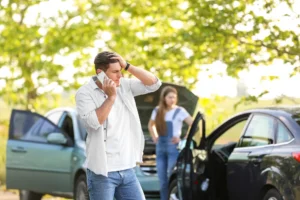

McGlone Law – Indianapolis Office
1052 Woodlawn Ave Suite B,
Indianapolis, IN 46203
(317) 495-1777
*Available 24/7
Copyright©2025, McGlone Law – The Accidents & Injury Attorneys. All Rights Reserved.